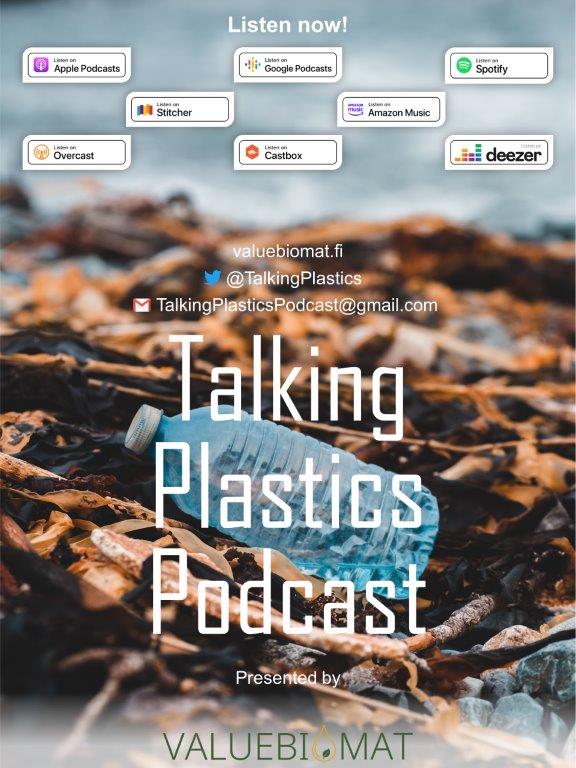Katri Valkokari
The researchers of the ValueBioMat project are eager to find new ways to disseminate the research results in order to actively support the transition towards more sustainable plastic ecosystems. A good example of this work is the Talking Plastics podcast hosted by our researchers. Listening to the podcast series, it is nice to hear how the researchers have employed the principles of Strategic Research Council (SRC) established by Academy of Finland. They are thoroughly committed to create societal impact and develop solutions to systemic grand challenges.
The whole podcast series is definitely worth listening to; anyhow, this blog post goes through the first five episodes in order to provide a short overview. The introductory episode sets the scene and introduces the multidisciplinary ValueBioMat research team. Research in the project covers different aspects from polymer feedstocks and digital production technologies to business models, life cycle assessment and regulatory aspects. The following four podcasts consider some of these above-mentioned aspects in more depth.
Regulating plastics
Episode #1 sheds light on the development, production and marketing of biobased plastics and other solutions in the circular economy from a legal perspective. Within the regulatory aspects, the obligations related to the Single-Use Plastics (SUP) Directive is a topic that has gained a lot attention. In addition, intellectual property (IP) related commercial arrangements and agreements between partners in the complex supply chains are an important tool to support the transition towards more sustainable plastic ecosystems. For instance, in broad R&D projects, the different partners must be able to protect their background knowledge, and the property rights to R&D results have to be transparent and fair from the perspectives of all involved actors.
The present and future of plastics economy
Episode #2 summarizes the present state and future challenges in the sustainable development of the plastics economy. With around 400 million tons of plastic produced every year, systemic changes across the entire plastics value chain are needed to curb the environmental impact of plastics production and use. The petrochemical and plastic industries are based on large investments, making investors the key actors in driving the transition towards a sustainable plastics economy. In addition, we need to consider how the already existing investments to the production facilitates can be utilized in the different phases of value chain to enable the transition. The episode also reminds us that the systemic change requires all of us to change our thinking and behaviour towards more sustainable choices.
Plastics; the good, the bad and the ugly
Episode #3 discusses the plastics life cycle from a polymer chemistry perspective. It explains how polymer scientists are working on making the different steps of the life cycle of plastics more sustainable. Different feedstocks and new recycling techniques are examples of science-based knowledge that enhance the transition. Thus, the episode reiterates the reasons why the plastics are an important part of our modern everyday life; plastics have a broad variety of different chemical structures and that gives an opportunity to find lightweight, cost-effective, and durable solutions to different products.
Techniques to evaluate novel plant-based feedstock for plastics
Episode #4 explains how plant oils provide an alternative for crude oil, natural gas and coal as feedstock for plastics production. Thus, scientific methods such as Multi-Criteria Decision making (MCDM) and Life Cycle Assessment (LCA) are needed to evaluate if and when plant oils are a suitable option. The episode points out that the use of plant oils is not a perfect solution, but rather calls for a careful consideration of the trade-offs related, for example, to the land use for agriculture in which the production of feedstocks for plastic production competes with food production and other applications. Thus, the episode notes that use of plant oils could be seen as s first step towards the broader utilization of alternative feedstocks.
What we are going to do next?
Already, these five episodes show how the systemic challenge can and must be approached from different perspectives. Luckily, the second period of our ValueBioMat projects is starting and we will be able to continue the multidisciplinary research work focused on contributing to a more sustainable plastics economy. Here, we are closely collaborating with several companies and other organizations that are part of our discussion platform and contact network that we call our Advisory Board. Let us know if you are interested to join!

